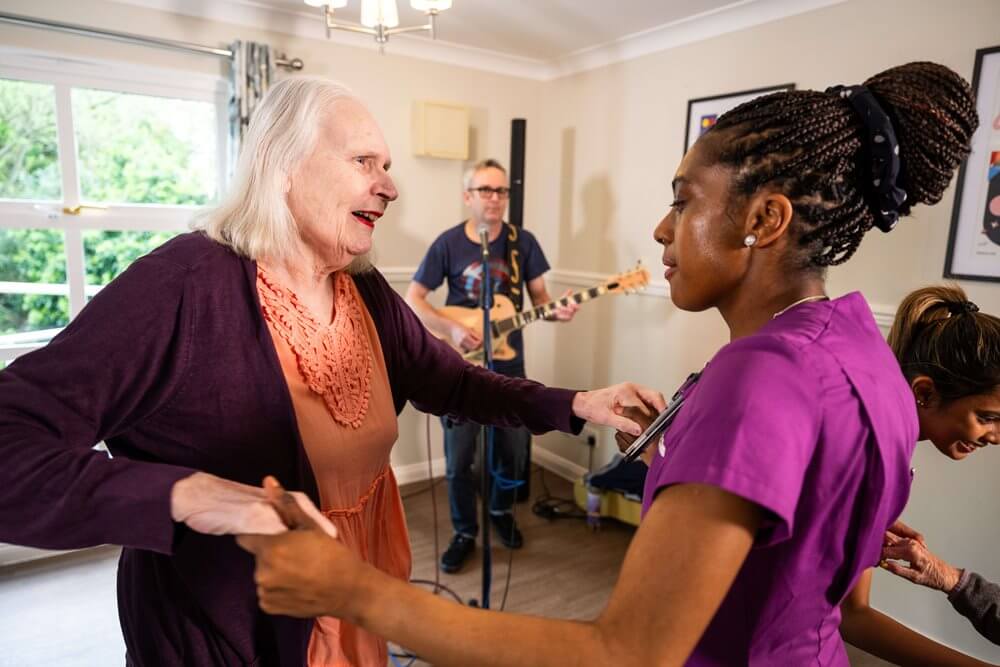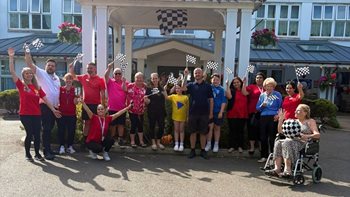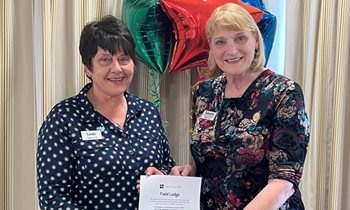Why music therapy is important for people living with dementia
A tinkling piano, a swelling orchestra or a jazzy drum beat – these are all sounds with the power to spark emotions and memories. Music and memory are deeply connected, and for people living with dementia, this makes music therapy an important tool for everything from self-expression and communication to lessening feelings of distress.
At Care UK, our person-centred approach to dementia care means we take the time to understand what music means as part of our life story work, we take the time to understand what music means to your loved one – whether it’s the sounds of the dance hall where they met their future spouse or the soothing lullabies they sang to their children. Our teams are led by expert guidance, so you can trust our dementia care is of the highest standard.
How does music affect memory?
The connection between music and memory can be a powerful one; we can all remember a time when a song stirred up a special memory. That’s because connects parts of the brain that are associated with memory, reasoning, speech and emotion.
For people living with dementia, these connections are all the more important. Fondly remembered music can spark cherished memories and offer opportunities for conversation, connection and reminiscence.
Music plays a vital role in the lives of our residents. For people living with dementia, music is more than just a pleasure — it can unlock long-forgotten memories, reduce feelings of stress, and create special moments of connection.
Lisa Maria OrtizLifestyle Lead at Appleby House Some studies have even found that music can help us to strengthen new memories, with singing having been shown to help people recovering from a stroke or brain injury.
How does music therapy for dementia work?
Music therapy involves using a qualified therapist to support a person living with dementia’s unmet needs. Music activities in care homes can involve anything from listening to beloved songs to playing instruments, singing or dancing.
Music has the potential for many benefits for people living with dementia, including:
- Improving mood
- Allowing for engagement and connection
- Reducing feelings of distress, such as anxiety, apathy or anger
- Supporting communication and social interaction
- Offering opportunities for physical exercise
- Reducing the need for medication
“Through music, we see remarkable changes in residents,” Lisa Maria says. “Smiles return, eyes brighten, and sometimes even those who are usually quiet begin to sing along.”
Because music is often connected with fond memories, it offers an opportunity for reminiscence with family members, friends or carers. Chatting about memories, or even simply singing along, evokes happy feelings.
One resident at Appleby House has a special love for the music of Elvis. “When she hears those familiar tunes, it’s as if a light switches on. Even though dementia has taken so much, we have yet to find a song she doesn’t know by heart. As long as there is music, she is content.”
The physical benefits of music are clear too – who doesn’t love to tap their toe or dance to their favourite songs? People living with dementia can benefit from the gentle exercise sessions that naturally occur during music therapy.
But one of the most powerful moments for Lisa Maria is when a visiting babies’ group joins the home. “Together, we sing songs from years gone by — the very same ones residents once sang to their own children. The joy, emotion, and sense of connection this brings is truly wonderful to see.”
How Care UK helps residents maintain musical hobbies
Music can help many people reconnect to old hobbies, such as playing an instrument, dancing or singing.
Our teams at Care UK get to know residents well through person-centred care so we can tailor activities to their unique interests. Music is an important part of the activities programme at Appleby House. Lisa Maria says the home’s musical activities include themed music appreciation afternoons, ‘name that tune’ games and residents’ requests sessions.
“One of the most popular activities is Desert Island Discs, where residents share the three songs they would take to a deserted island. Together we listen, score each song and celebrate a winner — sparking wonderful memories and lively conversation,” Lisa says. Conversations also spark up when the home introduces the residents to the music of today. “It’s always fascinating to hear their thoughts and opinions on new sounds and artists.”
What’s more, a regular choir and themed singalongs “bring the home alive with song, laughter and joy,” Lisa Maria says. “Through music, we see residents light up – engaging, reminiscing and sharing moments together that are truly special.”
Music is also used in therapeutic ways to support residents living with more advanced dementia. “In our Namaste room, we often project music videos and concerts tailored to residents’ favourites,” Lisa Maria says. “What happens next feels nothing short of magical. Residents in the later stages of dementia — sometimes sleepy or distressed — come alive when they hear their beloved songs. Smiles appear, hands tap, and voices join in, word for word.
“Moments like these remind us that music doesn’t just entertain — it connects, comforts, and brings joy in the most extraordinary way.”
Create a dementia playlist
The most effective dementia playlist will be one that’s personalised to your loved one’s favourite songs and artists.
Playlist for Life is a music and dementia charity that supports people with dementia to have a unique, personalised playlist that their friends, family and carers can use.
Discover more at Care UK
Want to find out more about our commitment to supporting residents living with dementia to live fulfilling lifestyles? Discover what life is like in a Care UK care home, and find out how we care for people living with dementia. Or, find your nearest care home to get in touch with the team directly.



